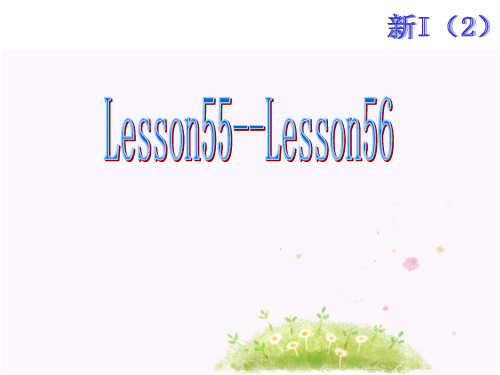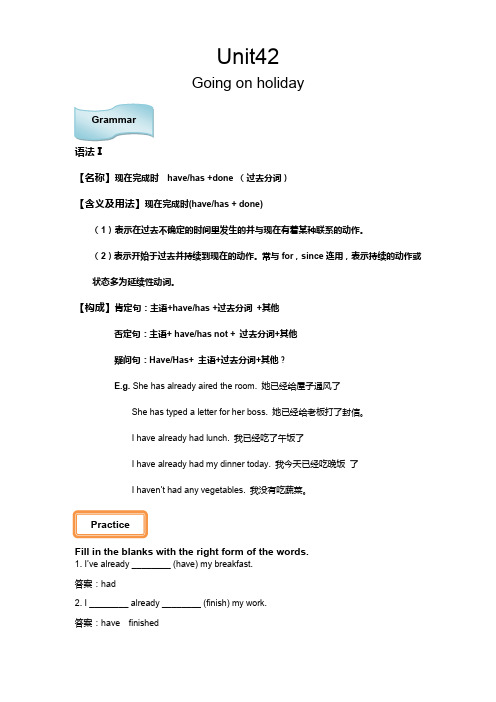成人版一册 Unit 55 教师版
- 格式:pdf
- 大小:626.33 KB
- 文档页数:11



新概念55课教案【篇一:新概念英语第一册55课课件】lesson 55new words:live[liv]居住stay [stei] 停留housework[hausw?:k] 家务活usually [ju:?u?li] 通常arrive[?raiv] 到达lunch [l?nt?] 午餐evening[i:vni?] 晚上night[nait] 夜晚new phrases:in the morning/afternoon/evening 在早晨/下午/晚上at noon/night在中午/夜晚go to work/school/bed 去工作/上学/睡觉take?to? 把??带到??do the housework 做家务do one’s homework 做作业read one’s newspaper 看报纸new sentences:what do/does + sb. usually/always/often do?sb. +adv. +do/does sth. 一般现在时句子表达(详见grammar) warming up activities:tell me something about your family.1、how many people are there in your family? who are they?2、what does your mother do after supper?3、what does your father like to do on weekend?after this, please open your book and turn to lesson 55, let us see who are the sawyers, and what do they like to do?read the paragraph by yourselves and then watch the vedio. now, please answer my question.what does mrs. sawyer usually do in the afternoon?when do the children always do their homework?grammar:一般现在时:表示经常的习惯性的动作或者是现在的状态,常与表示频度的时间状语连用,表示客观事实或普遍真理。



Lesson 55 ---The Sawyer family 索耶一家人in the morning/in the evening/at night 早晨/傍晚/晚上go to work/go to school 去上班/去上学take them to school 带他们上学take sb to a place 带某人去某地every day 每天stay at home 呆在家里do one's homework 做家庭作业do the housework 做家务eat one's lunch 吃午饭at noon/at midday 正午do sth together 一起做某事(go shopping together 一起去购物)drink tea 喝茶come home from school/come home from work 放学回家/下班回家arrive home late 到家很晚(不及物动词,不能直接加名次作宾语,通常要加一个介词。
)arrive at a village/arrive in Shanghaigo to bed 上床睡觉read one's newspaper 读报纸watch television 看电视(动词,作名词时是手表的意思)描述经常发生的动作或经常存在的状态时,用一般现在时。
和一般现在时连用的时间状语有:every day/at night/in the morning/in the afternoon/in the evening 经常连用的副词:usually/often/sometimesWhat do/does --- usually do? 某人通常做什么?breakfast/lunch/supper 早饭/中饭/晚饭The Sawyer s live at 87 King Street.姓氏后加s,前加定冠词the,表示某某一家人(the Smiths/the Johnsons)。
LESSON 55【场景演练】生病看医生,怎么办?(2)(请结合第一册课本第62 课内容参考学习)【单词银行】1.medicine n.(吞服或液体的)药物中国传统医药,简称:中药:traditional Chinese medicinePlease take this medicine and stay in bed for 5 hours.另外,medicine 做不可数名词,指医学,疗法I am studying medicine.在英语的名词中,如果:身体的部位+ ache (疼、痛)= ...疼或痛头部head + ache = headache 头痛牙齿tooth + ache = toothache 牙痛脊背back + ache = backache 背痛耳朵ear + ache = earache 耳朵痛胃部stomach + ache = stomach ache 胃痛2.dentist n. 牙医注意词根词缀“-ist”,从事某种职业的人形容词dental 牙齿的,牙科的dentist 牙医【场景演练】生病看医生,怎么办?(2)艺术家art + ist = artist小说家novel (名词,小说)+ ist = novelist旅行家tour + ist = tourist钢琴家pian (o) + ist = pianist [ˈpɪənɪst]3.temperature ['temprətʃə(r)]n. 温度场景一:指气温The temperature is very high today.低的low场景二:体温His temperature is rising.She is running a temperature. 她正在发烧。
He has a temperature.I am going to take your child’s temperature.场景三:room temperature 室温(不冷也不热)You can eat this dish at room temperature.【经典句型】请熟悉如下的病情及方式描述:【场景演练】生病看医生,怎么办?(2)Tom has an earache. So he feels very bad.Lily drinks some cold water, so she has a stomach ache.His dad has flu, not bird flu.Her mum has a toothache and she can’t sleep in the night.Ricky has a headache, because this problem is a headache for him.Lucy has measles. Don’t talk with her please.Jimmy has mumps, so he looks very terrible.在以上的病症中,flu, mumps, measles, bird flu 都是不可数名词或词组,均有传染性,请注意,它们是否有冠词?而与ache 有关的痛,都是具体的某个部位的,请再观察是否有冠词?【场景补充】在国外看病,一般都需要提前预约。
成人版一册+Unit+8+教师版Unit 8Your passports, please.Grammar【名称】名词变复数(规则变化)【规则】绝大多数的可数名词的复数形式,是在该词末尾加上-s。
E.g. book—books bag—bags pen—pens【不规则】1. 以-s,-x,-ch,-sh结尾的名词后面加-es构成复数形式。
E.g. class—classes bus—buses fox—foxeswish—wishes match—matches bench—benches2. 以辅音字母加-y结尾的名词,改y为ies,变成复数形式。
E.g. fly—flies city—cities lady—ladiesbelly—bellies duty—duties jury—juries3. 以f或fe结尾的名词,一般将f或fe变为v,再加上-es,变为复数形式。
E.g. life—lives leaf—leaves wife—wivesknife—knives thief—thieves hoof—hooves4. 以辅音字母o结尾的名词,一般在后面加-es构成复数形式。
E.g. potato—potatoes tomato—tomatoes hero—heroesnegro—Negroes echo—echoes【常用词汇复数】is、am—are this—these that—thoseE.g.单数复数例句Book BooksThese are my books. 这些是我的书。
Lady LadiesThese ladies are my friends. 这些女士是我的朋友。
Bus BusesThere are 5 buses in our town. 在我们镇上有5辆公交车。
ⅠWrite down the plural forms.1. fox ________2. brush ________3. stomach ________4. knife ________5. Negro ________6. path ________7. Chinese ________8. Englishman ________9. Japanese ________ 10. Frenchman_______ 11. German ________ 12. foot ________ 13. child ________ 14. story ________ 15. goose ________ 16. family ________ 17. waitress ________ 答案1. foxes2. Brushes3. Stomachs4. Knives5. Negroes6. Paths7. Chinese8. Englishmen9. Japanese 10. Frenchmen 11. Germans 12. feet 13. children 14. Stories 15. geese 16. families 17. waitressesⅡ Multiple choice.1. A: Are ________ Danish? B: Yes, they are.A. this girlB. these boysC. youD. your teacher 2. A: What are those? B: ________.A. It’s a red bookB. This are black umbrellasC. These is a carD. They are dogs 3.The carpet ________ my ________ is brown.A. under, footB. under, footsC. in, feetD. under, feet 答案 1.B解析:此题考查名词复数变化,答句中“they”表明针对第三人称复数提问,则只有“these boys”符合条件,故答案为B 。
Unit 55A good idea【名称】形容词比较级不规则变化【含义及用法】形容词的比较级和最高级: 形容词的比较级和最高级形式是在形容词的原级形式的基础上变化的。
分为规则变化和不规则变化。
1. 常用的不规则变化的形容词的比较级和最高级如下,这些不规则变化需要单独记忆:形容词比较级和最高级的不规则变化2. 形容词前加less 和least ,则表示“较不”和“最不”。
E.g. difficult 难 less difficult 较不难 least difficult 最不难interesting 有趣 less interesting 较无趣 least interesting 最无趣3.可数名词的多与少,用many 与few 来表达,相应地,其比较和最高级分别为more ,most 和fewer ,fewest ;不可数名词的多与少,则用much 与little 来表达,其比较和最高级分别为more ,most 和less ,least 。
E.g. I've made more mistakes than you have, and Rachel has made the most.我出的错误比你的多,而雷切尔出的错误最多。
I've made fewer mistakes than Rachel has, and you have made the fewest.原级比较级 最高级 good / wellBetter best bad / illWorse worst many / muchMore most littleLess least old older (新旧或年龄)/elder (兄弟姐妹的长幼关系)oldest/ eldest farfarther (表示距离,译为“更远”)/ further (表示程度,译为“进一步的”)farthest/ furthestGrammar我的错误比雷切尔少,而你的错误是最少的。
I've got more water than you have, and Rachel has got the most.我的水比你的多,而雷切尔的水最多。
I've got less water than Rachel has, and you've got the least.我的水比雷切尔的少,而你的水是最少的。
PracticeComplete the sentences.1. Tommy's homework is much ________ (good) than it was last year.2. The green apple is as ________ (sweet) as the red one.3. Andy made ________ (many) mistakes than Tina did in the test.4. It's very boring. This is the ________ (interesting) book I have ever read.5. This blue ear is cheaper than that car. It means this blue car is ________ (expensive) than that red one.答案1. better2. sweet3. more4.least interesting5. less expensive解析1. 句意:Tommy今年的家庭作业做得比去年好多了。
本题主要考查形容词比较级的特殊变化,根据good/well→better→best我们可以判断答案应为good的比较级better。
2. 句意:绿色的苹果跟红色的苹果一样甜。
本题主要考查形容词比较级句型中as + 形容词原级+ as的句型,所以sweet在本句中为原级。
3. 句意:在(这次)考试中,Andy犯的错误比Tina要多。
本题主要考查形容词比较级的特殊变化,根据many→more→most我们可以判断答案应为many的比较级more。
4. 句意:这实在是太无聊了,这是我看过的最无聊的书。
本题主要考查形容词最高级的特殊变化,由于interesting 为多音节词,所以应该带前缀词,形容词前如加least 则表示为"最不" ,所以答案应为least interesting。
5. 句意:这辆蓝色车比那个车更便宜,就是说这辆蓝色的车没有那辆红色的车那么贵。
本题主要考查形容词比较级的特殊变化,形容词前如加less 和least 则表示"较不"和"最不" ,因此表示较不贵的方式应为less expensive。
Sentence structure【名称】形容词比较级及最高形句型【含义及结构】1.A+ be + (much ,a lot ,a little ,a bit , far, even )+ 比较级+ B.比较级前面可以加上表示“程度”的词或短语,修饰比较级,表示对程度进行强调。
意思是“更…”,“(大/小/多/少/好/坏等)得(多/少)”E.g. He is much taller than I.他比我要高得多。
2. 具体数量词+ 比较级比较级前面可以加上表示具体数量差别的结构表示具体“大多少”,“小多少”,“长多少”,“短多少”等E.g. I am two years older than he.我比他大两岁。
3.比较级+ and + 比较级意思表示为“越来越……”E.g. It is getting warmer and warmer.天气越来越暖和。
4.“the + 比较级…,the + 比较级…”表示“越……,就越……”E.g. The more,the better.多多益善。
5. “less + 原级+ than…”本句式常常用于表示不及另一方的情况E.g. She is less healthy than he. 她的身体没有他那么健康。
PracticeTransform the following sentences into another way.1. You are taller than I am.______________________________________________2. You've got more vegetables than I have.______________________________________________3. You've got heavier boxes than I have.______________________________________________4. You've made fewer mistakes than I have.______________________________________________5. You've got more sugar than I have.______________________________________________答案1. I am the shortest.2. I've got the least vegetables.3. I've got the lightest boxes.4. I've made the most mistakes.5. I've got less sugar than I have.vocabulary整体呈现idea n. 主意a little少许a few几个teaspoonful n.一满茶匙的(量)less adj.较少的,更少的pity n.遗憾instead adv. 代替advice n. 建议,忠告most adj. 最多的(many, much的最高级)least adj. 最小的,最少的(little的最高级)best adj. 最好的(good的最高级)worse adj. 更坏的(bad的比较级)worst adj. 最坏的(bad的最高级)重点词汇解析1. idea【释义】名词,想法;主意;概念E.g. I have a good idea. 我有个好主意.【辨析】区分idea与opinion ,thought, view. Idea表达的含义较广,表示主意,想法,各种看法opinion 主要指对某事具体的看法、观点、想法E.g.In my opinion, that’s a good idea. 在我看来,那是个好主意.thought 思想;思考;想法;关心,主要特指成系统的思想,E.g. I wonder who thought of the idea.javascript:void(0); 我纳闷谁想出这个主意的。
view 意见,表示个人观点,侧重个人意见E.g. I have the same view.javascript:void(0); 我也有同样的观点。
good idea 好主意bad idea 坏主意Intelligent idea 聪明的主意someone(somebody)’s idea 某人的主意2. a little【释义】副词词组,少量地,稍许地形容词词组,少量的,稍许的【辨析】区分a little/littlea little修饰不可数名词,表示肯定含义(即为有);虽然少,但是还是有的,词义重心落在”有”的上面.little 修饰不可数名词,表示否定含义(几乎没有);不仅少,而且是几乎没有,词义重心落在”几乎没有”上.可数名词的多与少,用many与few来表达;不可数名词的多与少,则用much与little来表达。
E.g. He has little money. 他几乎没有钱.He has a little money. 他有一点钱.I have a little milk. 我(杯子里)还有一点牛奶。
I have little milk. 我(杯子里)几乎没牛奶了。
3. a few【释义】形容词词组,一些【辨析】区分a few/fewa few 修饰可数名词,表示肯定含义;few 修饰可数名词,表示否定含义可数名词的多与少,用many与few来表达;不可数名词的多与少,则用much与little来表达。
E.g. She has a few friends here. 在这里她有几个好朋友。